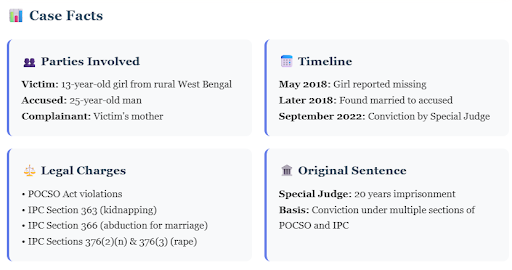



In May 2025, the Supreme Court, using Article 142, withheld sentencing a man convicted under the POCSO Act, prioritizing the victim’s welfare. The victim, married to the accused with a child, suffered more from legal fallout than the incident. The court criticized systemic failures and directed rehabilitation, sparking concerns about precedent.

Copyright infringement not intended
Picture Courtesy: THE HINDU
The Supreme Court (SC) declined to impose a sentence on a man convicted under the Protection of Children from Sexual Offences Act, 2012 (POCSO Act), recording that the victim did not view the incident as a crime and had suffered more from the legal fallout.
The POCSO Act was enacted in 2012, to protect children under 18 from sexual offenses.
It criminalizes acts like penetrative and non-penetrative sexual assault, sexual harassment, and child pornography.
The law applies equally to boys and girls, treating all minors as incapable of giving consent. This means any sexual activity with a minor, even if claimed to be consensual, is illegal.
The Act ensures child-friendly processes, such as special courts, private (in-camera) trials, and video-recorded testimonies.
It imposes strict penalties, presumes the accused guilty until proven innocent, and mandates quick trials to deliver justice swiftly.
In May 2018, a 13-year-old girl from rural West Bengal went missing. Her mother filed a First Information Report (FIR), the police discovered that the girl had married a 25-year-old man.
Despite her mother’s attempts to bring her back, the girl stayed with the man and later gave birth to a daughter.
A special court in September 2022 convicted the man under the POCSO Act and sections of the Indian Penal Code (IPC), including Section 363 (kidnapping), Section 366 (abducting a woman to compel marriage), and Section 376 (rape, including repeated rape and rape of a minor under 16). The court sentenced him to 20 years in prison.

The Calcutta High Court, however, overturned this conviction in a controversial ruling. Using its special powers under Section 482 of the Code of Criminal Procedure, the court argued that the relationship was consensual, despite POCSO’s clear stance that minors cannot consent.
The High Court suggested that POCSO should not apply to consensual relationships involving adolescents. The ruling attracted widespread criticism for undermining the POCSO Act’s purpose.
In August 2024, the Supreme Court took suo motu cognizance of the case, the Court reversed the Calcutta High Court’s ruling, and stated that POCSO does not recognize consensual sex with minors.
The court criticized the High Court for imposing personal opinions and social commentary instead of sticking to legal reasoning. The SC stressed that court judgments must remain law-focused.
However, in May 2025, the SC declined to sentence the convicted man, based on a report from a three-member expert committee it had appointed to meet the victim.
Expert Committee Report
The committee found that the victim, still committed to the accused, faced immense hardship from police, society, the legal system, and her own family, who abandoned her.
The report called the POCSO Act’s implementation a “collective failure” in this case, as the legal process caused the victim more harm than the incident itself. Mentioning that the victim did not view the incident as a crime and was now married to the accused with a child.
The committee recommended keeping the family unit intact for the child's welfare.
Final Supreme Court Decision (May 2025)
Using Article 142 (extraordinary jurisdiction), the Supreme Court withheld sentencing while directing the West Bengal government to ensure the victim's welfare and rehabilitation.
The court observed: "The society judged her, the legal system failed her, and her own family abandoned her" - highlighting systemic failures beyond legal technicalities.
Victim-Centric Approach => The court prioritized the victim's current welfare over punitive justice, noting she did not view the incident as a crime and suffered more from legal proceedings.
Article 142 Application => Used constitutional extraordinary jurisdiction to balance legal principles with humanitarian considerations.
Welfare Over Punishment => Directed government support for rehabilitation rather than focusing solely on criminal punishment.
Systemic Failure Recognition => Acknowledged collective failure of society, legal system, and family in protecting the victim.
Precedent Risks
While the court emphasized this should not set a precedent, there are concerns about potential misuse where perpetrators might hide behind 'family protection' to exploit vulnerable girls.
Core Legal Tensions
Rule of Law v/s Equity: Balancing legal consistency with individual justice
Deterrence v/s Rehabilitation: Prioritizing victim welfare over societal deterrence
Child Protection v/s Agency: Recognizing victim's current circumstances while maintaining protective framework
India urgently needs comprehensive sex education and stigma-free curriculum to address root causes of such situations.
Sex Education => Age-appropriate comprehensive sexuality education in schools to build awareness about consent, rights, and safety.
Legal Literacy => Programs to educate communities about child protection laws and their importance.
Social Support Systems => Strengthening community-based support systems for vulnerable children and families.
Prevention Focus => Shift from purely punitive to preventive approaches through education and awareness.
Legislative Review => Parliament may need to consider amendments to POCSO Act to address complex situations while maintaining child protection objectives.
Judicial Guidelines => Need for clear guidelines on when extraordinary constitutional powers can be exercised in child protection cases.
Policy Integration => Integration of child welfare, education, and legal protection policies for holistic approach.
Must Read Articles:
Source:
|
PRACTICE QUESTION Q. Discuss the balance between ensuring justice for child victims under the POSCO Act and safeguarding the rights of the accused in cases of false allegations. 150 words |






© 2026 iasgyan. All right reserved